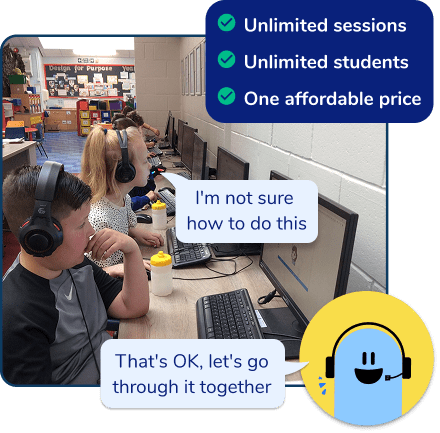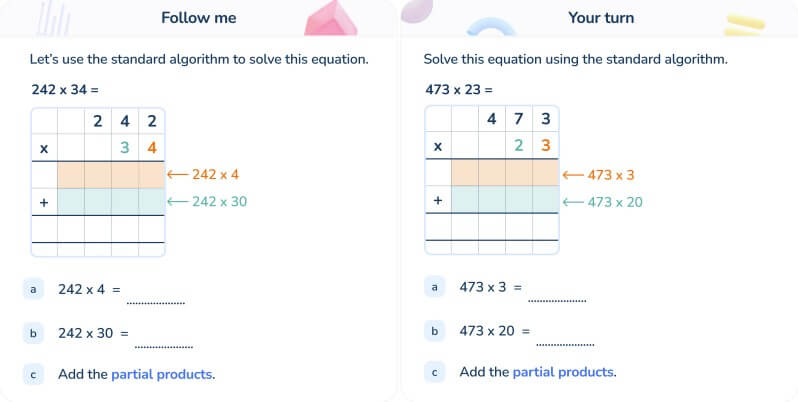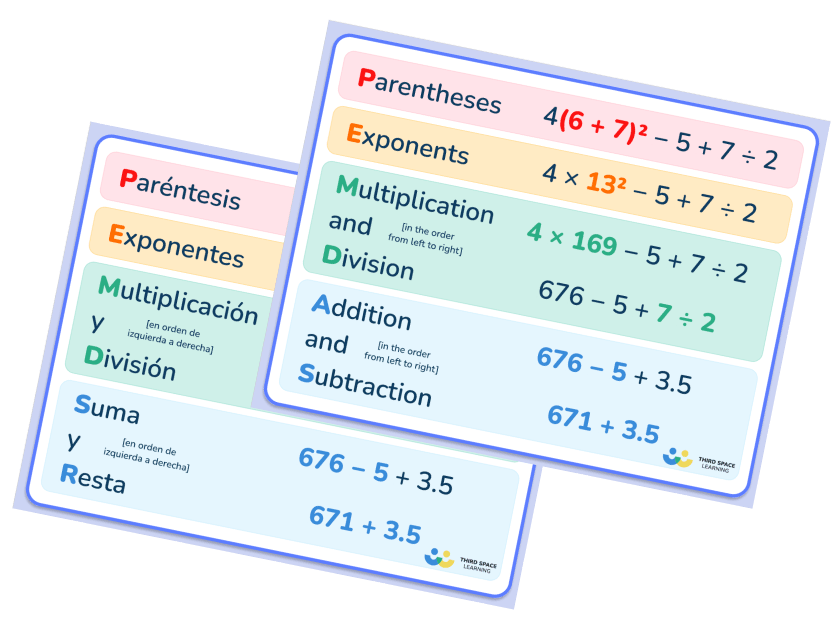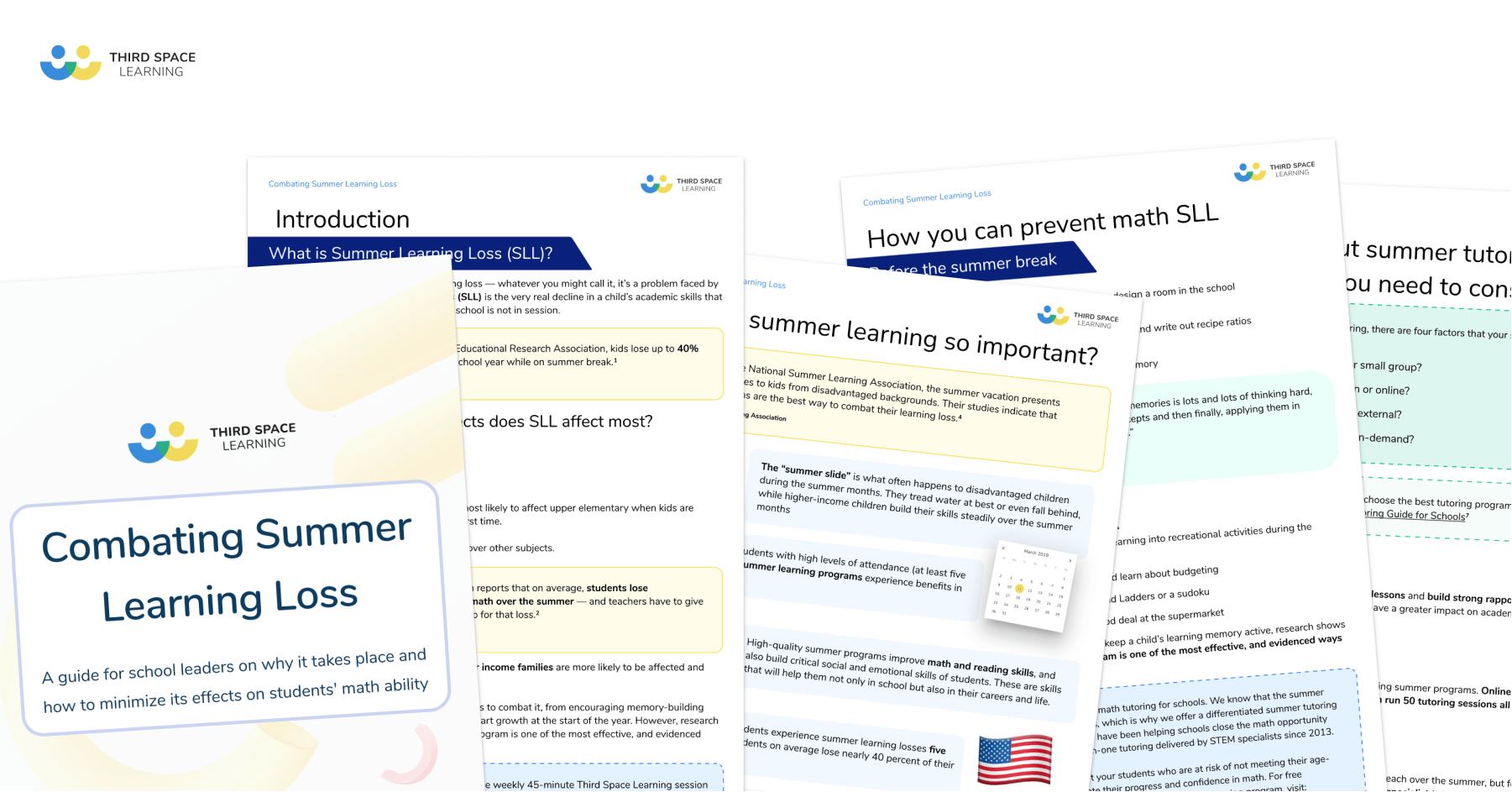How To Prevent The Summer Slide: 9 Ways To Prepare Students For The New School Year
The summer slide is something that many educators might be unaware of, but with the school year flying by and the prospect of an eight-week break from learning on the horizon, preparation for summer learning loss should form an important part of any summer vacation plans.
In this blog, we share 9 ways to ensure children return to school with no gaps in their knowledge. Educators can help parents by sharing these tips with them before the summer break.
The start of the elementary school summer vacation represents a gap of eight weeks or more from education within which children may well not be:
- Learning new skills;
- Absorbing new knowledge;
- Testing and practicing their existing knowledge.
This means that over the vacation, many children may suffer from the phenomenon of the summer slide, where they struggle to retain the knowledge they have already picked up throughout the school year.
The School Leader’s Guide to Combating Summer Learning Loss
A guide for school leaders on why Summer Learning Loss takes place and how to minimize its effects on students’ math ability
Download Free Now!What is the summer slide?
The summer slide is a decline in a child’s academic skills that occurs over the summer vacation when school is not in session.
The summer slide goes by a number of names, including the summer learning loss and the summer brain drain, but in essence, they all mean the same thing, and that is:
“…over the summer vacation children are likely to forget a lot of the information and knowledge they have picked up over the past academic year.”
This is a phenomenon that occurs among almost every student of every age, but it has a particular tendency to occur in upper elementary when children are learning a lot of new concepts for the very first time.
It can be hard to tell whether or not the summer brain drain is happening over the vacation period as nothing seems to change on a day-to-day basis. However, even if a child:
- is forgetting the answers to simple multiplication facts questions such as 11 x 12;
- is forgetting simple grammatical rules such as capitalization of proper nouns;
- is forgetting the difference between their, they’re and there;
- is not reading as fluently as they were previously,
then it is a sign that a loss of learning has taken place.
Why is the summer slide a problem?
Aside from the obvious point that a child has forgotten some potentially valuable knowledge that they had previously squirreled away in their brain, there are other issues caused by the summer brain drain.
The first of which involves the class teacher.
If a group of children comes back to school after a summer packed with fun and no math, English or science, then this likely means that there is going to be a lot for the teacher to recap and go over when the start of the new academic year comes.
This also means that no new learning can take place until the old knowledge gaps and holes that have appeared have been filled in again.
The second issue is that children who suffer from summer learning loss will likely end up behind their peers. Children who avoid a summer learning loss will come back to school raring and ready to tackle all of the new topics and concepts that will be thrown at them.
Children who suffer from the summer slide will have to work to get back to the level of their peers and may therefore fall behind in their learning.
Now, this might sound a little scary, but you’ll be pleased to hear that there are a number of simple things you can do to help prevent summer learning loss!

Meet Skye, the voice-based AI tutor making math success possible for every student.
Built by teachers and math experts, Skye uses the same pedagogy, curriculum and lesson structure as our traditional tutoring.
But, with more flexibility and a low cost, schools can scale online math tutoring to support every student who needs it.
Find out moreHow to prevent the summer slide
There is a simple, yet very effective method to prevent the summer slide from becoming an issue, and it is the following…
Keep children learning all summer long.
There is no need to panic.
This does not mean that parents need to turn the spare bedroom into an elementary classroom.
Learning throughout the summer simply means providing children with opportunities to continue practicing their skills and using their knowledge outside of the school environment.
We’ve come up with 9 ways you can do this below, so take a look and get ready for a summer of learning!
9 ways to stop the summer slide
Here are 9 quick and easy ways you stop the summer brain drain from taking place this summer!
1. Introduce a summer reading program
Whether it is 15 minutes of reading per day, or finishing 3 books over the break, creating a summer reading program for children can be a simple yet highly effective way to keep them learning over the summer break.
Activity idea
Ask a child to choose 2 or 3 books (that are appropriate to their reading level) to finish over the summer break. Then, when they have finished each book, ask them to prepare a 5-minute presentation on some of their favorite things about the book.
How will this help prevent the summer slide?
Having time set aside for reading over the summer gives children the chance to not only cement the vocabulary they have learned over the past year but also incorporate new words into theirs.
By having a short debrief after they have finished a book, they will not only be able to practice their vocalization skills but also check and clarify any words or phrases that they are not familiar with too!
2. Bring math into the real world
Unfortunately, math is one of the school subjects that often suffer the most from the summer learning loss. With so many different areas of math to remember, some children may find themselves forgetting elements of it over the summer break.
Fortunately, the variety of activities that most children partake in over the summer presents the perfect opportunity to test out some real-world math skills. Something as simple as going for a walk or heading to the swimming pool can lead to any number of math problems being discussed.
Activity idea
This one is very simple, but it does require some creative skills. Whatever is planned over the summer vacation, see if an element of math can be added to it.
A trip to the supermarket becomes “the deal says I can get three packets of burgers for $10, but they are $3.50 each. Is the deal worth it?”
Or a simple walk could be elevated by asking “If every tree has 2,000 leaves on it and there are 10 trees, how many leaves are there in total?”
The possibilities here are endless!
How will this help prevent the summer slide?
Testing math in a real-world environment will not only give children a chance to continually test their math knowledge, but it will also enable them to do so in a real-world context.
Percents will always come in handy when looking at discounts in a store, and money is a huge part of our everyday lives; summer can be used to test as many areas of math as possible.
3. Learn a language
Even though the summer break isn’t long enough to become fluent in an additional language, they are a great chance for young linguists to test out their talents.
If a family is lucky enough to be heading on a trip abroad over the summer break, this time can be used to test out a child’s basic French, Spanish, or any other language!
Activity idea
Under careful supervision, ask a child to take part in an exchange in a local shop or restaurant.
Teaching them how to ask for a bottle of water or to say thank you for some food can be a quick and fun way to incorporate learning into a vacation.
We’ve got a blog all about math in French that can be used for inspiration on this topic.
How will this help prevent the summer slide?
Learning a language is one of the best ways to keep a child’s brain ticking over and throughout the summer.
As anyone who has attempted to learn a language later in life will testify, it is no mean feat. As well as testing their brain to the max, children will be able to use their newfound language skills to verbalize with lots of new people!
4. Get children outside in the garden
The sun is out (hopefully), children are looking for something to do, and the garden could do with a spruce up.
Luckily, all the ingredients are there for a fun summer learning activity!
By getting children to help in the garden, they are being introduced to a nature-filled classroom on their doorstep, which can open up a whole new world of exploration and potential interests.
Activity idea
Ask children to dig up an old flowerbed and see which animals they can discover living in the soil. Will they be able to spot a worm, a woodlouse or a butterfly hiding away somewhere in the garden? If so, how many of each?

How will this help prevent the summer slide?
Working in the garden isn’t just a great way to become immersed in nature and lessen screen time over the summer vacation. It also presents a chance to introduce cross-curricular learning into the summer schedule.
As well as the obvious scientific elements that go into spending time in the garden with animal and plant life, there is the option to introduce math:
If there are 10 worms in 1 sq. foot of soil, how many are there in our 30 x 30ft garden?
I’ve seen 5 different species of birds in our garden this week, and each bird has laid 3 eggs in their nest. How many birds will there be when they all hatch?
Or to introduce English:
Write me a story on how the animals in our garden work together in their ecosystem.
Or to introduce any other topic you can think of!
5. Visit an educational place that isn’t the classroom
If you can arrive early enough to beat the lines, summer is the best time to take a trip to a museum or other place of learning with children.
After a while, classrooms can lose their allure to young minds, but a trip to the science museum, the zoo or even a national park can help spark or rekindle a love of learning in children, and this is something that could prove invaluable come the start of school!
Activity idea
If there are hands-on activities taking place in the museum or another educational location, then try and sign children up for them as this is a fantastic way to help them learn more from the experience.
If there are not any activities taking place during a visit, or if places are filled, then the time can be taken to ask children to interpret what they see and encounter. Children learn best by answering open-ended questions, so try and ask things like:
- What do you think the Romans used this tool for?
- How do you think it would feel to sleep in a cave?
- Why do you think some dinosaurs were so big?
How will this help prevent the summer slide?
Children love hands-on learning and this is exactly what this is! They will be outside the classroom, sometimes looking at things that they will have never seen before, and by asking them questions that require deep thought about the answer, this will be providing a very engaging learning experience!
6. Get the equipment ready and start baking
The perfect activity for a trip to see the grandparents, learning while baking is a great pick for many children as on top of the chance to learn and grow their knowledge, more often than not there is a tasty treat at the end!
Activity idea
Luckily, baking lends itself to math very well, and making a cake means children will be able to test out their fractions, and weighing skills among others.
As the cake is being created, children can be asked how much of each ingredient would be needed to make a cake that would be twice as large or one-quarter of the size.
Children could also be challenged to convert the unit of weight between pounds and ounces.
There are a number of ways to bring math into baking thanks to the precision needed to bake that perfect cake!
How will this help prevent the summer slide?
Math is often one of the first skills to be forgotten over the summer break, and when children aren’t tasked with deciphering decimals or figuring out fractions on a daily basis, this makes sense.
So, bringing these areas (among others) into a real-life situation can help to cement this knowledge in children and prevent summer learning loss.
7. Put the tools away and do some DIY
Doing DIY doesn’t have to be boring, especially if it comes in the form of a DIY science experiment with your child.
With a huge number of free resources available online, it is easy to locate a number of simple science experiments that children can try over the summer break.
Activity idea
It was a classic school activity for many of us, but figuring out how to protect an egg from a high drop can be a great way to get your child thinking outside the egg box.
Make it a competition with ice cream for the winner, and see who can best protect their egg from a high drop. Will children choose to use cotton, wool and cardboard, or will they go with something more elaborate like a paper parachute?
Leave the choice up to them, and the result will be a fun and interesting science lesson for everyone!
This is an example of using concrete resources within learning, and if you’d like to learn more about what concrete resources are and how you can use them with math, we’ve covered that in our blog.
How will this help prevent the summer slide?
Keeping children’s brains working over the summer is very important, and activities such as the one described above will do just that. It forces them to think about the solution as a whole rather than just thinking about individual elements of it, and problem-solving skills like this are very important when school starts again.
8. Keep a record of the summer vacation
Writing has not had much of a mention in our list so far, but this activity is the perfect way for children to continue practicing their writing over the summer break.
Whether it comes in the form of a diary detailing what they have been doing, or even a weekly postcard to their class telling them all about their favorite thing from the last 7 days, writing on a regular basis should form an important part of a child’s summer break structure.
Activity idea
Get children to ‘send’ a weekly postcard to their teacher that details their favorite thing they have done over the past week.
Writing about all of the different things they have been doing over the summer will present a challenge to children as they’ll have to think of the right words and phrases for each activity.
How will this help prevent the summer slide?
It can be easy for children to fall out of writing practice over the summer vacation, and by initiating a simple task such as the one above, it will be eliminating this problem.
From the day they arrive back at school, children will be expected to write about a wide variety of topics, so ensuring they do so over the break means that they will not need to spend time catching up upon their return.
9. Set some learning-based goals
‘When school ends for the summer, learning does too.’
Try to avoid this mindset. Regular practice can help to prevent the worst of the brain drain.
This can be split into slots over the week so that it can be fitted around any planned activities.
Start small by introducing 15 minutes of daily work practice, regardless of the topic, and by doing this children will be able to track and monitor their own progress over the summer.
Activity idea
Print off a simple weekly calendar from the internet and pin it to the fridge. Then sit down with a child to make ‘math Mondays’, ‘science Saturdays’ etc.
If a schedule is agreed upon, it is much more likely to be stuck too!
How will this help prevent the summer slide?
Without regular time scheduled, it can be easy for children to slip out of the routine of learning, and if this happens, the summer learning loss will become all the more pronounced.
Ensuring that there is a small portion of time attributed to learning every day (or at least every other day), will help keep summer learning loss to a minimum.
BONUS: Enrol for summer math tutoring
Looking for a more formal solution to combat learning loss and prepare for the next year?
Third Space Learning offers personalized one-on-one AI math tutoring for every student who needs it over the summer.
Here’s a sample lesson slide from our 5.NBT.5 – Multiplying whole numbers using the standard algorithm lesson created by our fantastic team of previous US teachers and delivered by Skye, the AI math tutor.

To plan a bespoke program, register your interest today!
Summer learning is important, but it isn’t everything
It is important to remember that when we talk about summer learning, we don’t mean that children should be tied to the desk and made to answer question after question, depriving them of their summer of fun.
We simply mean that learning should not be forgotten over the summer break.
Little and often is the way to go here.
It doesn’t matter how it’s approached, but working to prevent the summer slide will help children return to school with a spring in their step and no gaps in their knowledge.
Let us know how you get on this summer!
Read more:
- 10 Minute Math At Home: Number Facts Paper Flip
- How You Can Create Amazing Before And After School Routines
- How To Help Your Child Learn Multiplication Facts At Home
Do you have students who need extra support in math?
Skye—our AI math tutor built by experienced teachers—provides students with personalized one-on-one, spoken instruction that helps them master concepts, close skill gaps, and gain confidence.
Since 2013, we’ve delivered over 2 million hours of math lessons to more than 170,000 students, guiding them toward higher math achievement.
Discover how our AI math tutoring can boost student success, or see how our math programs can support your school’s goals:
– 3rd grade tutoring
– 4th grade tutoring
– 5th grade tutoring
– 6th grade tutoring
– 7th grade tutoring
– 8th grade tutoring
The content in this article was originally written by primary school teacher Sophie Bartlett and has since been revised and adapted for US schools by elementary math teacher Christi Kulesza.







